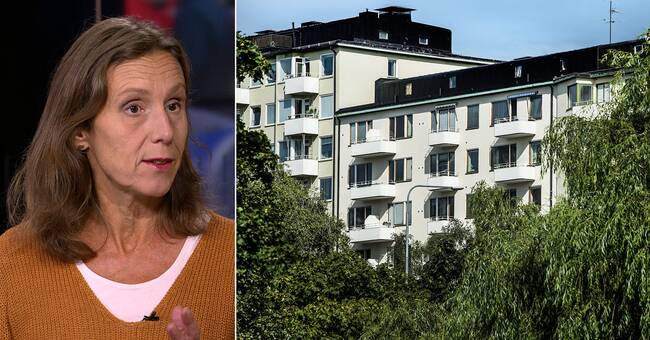Borrow and think of other things.
That is what the Riksbank is really saying to mortgage borrowers now.
A message that goes against everything that the Riksbank has warned about for a decade or two.
Housing prices have risen at rocket speeds in Sweden, as has household indebtedness.
It is the Riksbank itself that has paved the way for this possible housing bubble by keeping interest rates extremely low ever since the financial crisis.
The Riksbank has not seemed to have a choice because the task is to keep inflation at two per cent, and lower inflation than that thus needs to be offset by lower interest rates.
But the Governor of the Riksbank has repeatedly warned of the housing bubble.
Admittedly, prices fell - in a controlled manner - in connection with the amortization requirement being introduced in 2017, but since then they have struggled upwards again.
"Panic in the financial markets"
At the beginning of the corona crisis, when the world was more or less stopped, there was an initial panic in the financial markets.
The stock markets plummeted and the credit markets became alarmingly sluggish.
Deep crisis in the real world, ie for companies and households, is bad enough, but when the crisis reaches the financial markets, it will often be worse.
And the housing market is central to large parts of the banking system - it was housing lending that triggered the entire global financial crisis just over ten years ago.
So central banks around the world began pumping money into the system to compensate for the uncertainty.
Among other things, the Riksbank decided to lubricate lending to companies, municipalities and housing by buying bonds.
Mortgage bonds are the banks' way of getting the money they lend to mortgage customers.
Since the corona crisis began, the Riksbank has bought mortgage bonds for SEK 140 billion.
In this way, the risk with mortgage bonds has decreased and interest rates have been able to be kept down.
In the end, it means lower mortgage rates.
Which was also the point.
The Riksbank simply wanted to do everything possible to avoid the corona crisis causing a collapse in the housing market, with high interest rates, the unemployed not being able to pay interest, and a price drop that leaves people in debt when they are forced to sell.
It seems to have worked.
The housing market has been stronger than most expected.
Prices are even higher than before the corona crisis.
Nothing will be praised in the future
The Riksbank does not believe that there will be any price race in the future even before the corona crisis is over.
This is the main scenario in today's monetary policy report.
There are two more scenarios in the report: a joy scenario, and a depressive scenario based on a second wave of infection.
In the latter, there will be more bankruptcies and unemployment of 12 percent.
In that situation, the Riksbank expects housing prices to fall.
But if it goes as the Riksbank and most others believe most, then prices will not fall.
And then the next question is: Did the Riksbank's corona measures in the housing market work too well?
If what the Riksbank has done with its bond purchases is to fire up house prices, they can really pick up speed now with the new almost-promise of zero interest rates three years ahead.
But - the fact that those who are going to take out new housing loans or refinance old ones may not have to think so much about the Riksbank's interest rate decision does not mean that it is calm.
Instead, it is wise to keep track of the rest of the world - there is quite a lot that can go so wrong that the housing market here in Sweden is also starting to shake.
Or one's own personal finances.
Then it is good with a reasonable level of debt.

